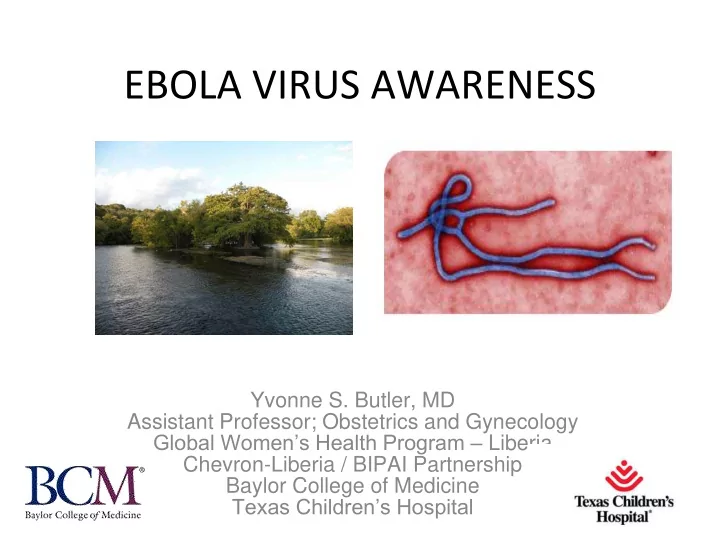

EBOLA VIRUS AWARENESS Yvonne S. Butler, MD Assistant Professor; Obstetrics and Gynecology Global Women’s Health Program – Liberia Chevron-Liberia / BIPAI Partnership Baylor College of Medicine Texas Children’s Hospital
What Is Ebola? • A Filovirus that causes haemorrhagic fever resulting in damage to the blood vessels and many organs (intestines, stomach, liver, etc) • There are five species of the virus, typically named from the region/country it was isolated: – Bundibugyo Ebolavirus – Reston Ebolavirus – Sudan Ebolavirus – Tai Forest Ebolavirus – Zaire Ebolavirus
Viral Hemorrhagic Fevers • Ebola Virus • Lassa Fever • Marburg fever • Yellow fever • Rift Valley Fever • Crimean-Congo fever
How Does It Spread? • Human to human contact – Contact with an infected person’s blood, saliva (spit), semen, vaginal fluid, vomit, feces (toilet), urine – Contact with any objects, including clothes, etc. that an infected person (or a dead person) has contaminated – Contact with infected bush meat – Contact with infected fruit bats
Centers for Infectious Disease Control and Prevention 2014
Ebola Transmission (Spread) • You can get infected through direct contact with an infected wild animal, like gorillas, monkeys, etc http://www.dawn.com/news/934016/bushmeat-off- – AVOID BUSH MEAT the-menu-in-the-us • Bats might spread the Ebola virus to animals (monkeys, gorillas) – DO NOT EAT or HANDLE BATS
Transmission in Health Facilities
Ebola Symptoms • Fever, headache, chills, weakness • Vomiting and diarrhea • Rash, Joint pain • Red eyes • Hiccups • Bleeding Internal – gut (stomach, throat, etc.) External – Eyes, nose, ears, mouth, vagina, etc
Uganda MOH Viral Hemorrhagic Fever
Transmission Time • The amount of time from infection to the onset of symptoms varies – 2 to 21 days – This means that if you are exposed to the Ebola virus, it may take up to 21 days before you start to have symptoms
Do I Have Ebola if I Have… WHO Infection Control for Viral Hemorrhagic Fever.1998
Is Ebola A Serious Illness • Yes • Up to 90% of people infected with Ebola (Zaire sub-type) will die • There is no cure • There is no vaccine • Everyone is at risk for getting this disease
How Do You Test For It? • Special blood tests in a few labs across the world – Guinea – France – United States – Central Africa
What Is The Treatment? • There is no medication to cure Ebola • Patients are provided oxygen, IV fluids (drips), blood, etc. for general support
Who Is At Greatest Risk For Ebola? • Healthcare workers • People in areas where Ebola cases have been documented • Family members of patients suspected or diagnosed with Ebola • People who come in close contact with a person diagnosed with Ebola
Ebola Virus Prevention (1) • Stay away from high risk areas – Lofa County – Guinea • Conakry, Guekedou, Macenta, Dabola – Sierra Leone/Liberia Border
Ebola Virus Prevention (2) • Avoid people who are sick from high risk areas • Avoid isolation areas at hospitals and clinics – JFK – Cholera Unit – Firestone – Isolation Unit – Redemption Hospital – Isolation camp outside WHO Infection Control for Viral Hemorrhagic Fever.1998
Ebola Virus Prevention (3) • Wash your hands frequently • Do not touch blood, body fluids, or secretions of anyone • Avoid touching your face • Do not touch the body of a dead person suspected of having Ebola
Ebola Virus Prevention (4) WHO Infection Control for Viral Hemorrhagic Fever.1998
Prevention in Health Facility http://www.bbc.com/news/world-africa-26701733 WHO Infection Control for Viral Hemorrhagic Fever.1998
What If You Feel Sick ? Uganda MOH Viral Hemorrhagic Fever
If You Feel Sick…Do NOT • Do NOT report to work – Call your boss, and inform him/her of your illness • Do NOT have contact with your wife, children, family, neighbors (etc.) – Protect your family • Do NOT take take public transport (taxi, pem- pem, etc. • Do NOT lie about how you feel or the symptoms you have
If You Feel Sick… Do • Wear a mask to protect others • Report to the nearest isolation center or • Call the MOH and ask where can you get treated • Call everyone you’ve come in contact with and warn them to avoid others, and report for an evaluation
Is This Ebola Thing Real Doc? • Guinea – 122 suspected cases (who 4/1/2014) – Probable and suspected cases include 11 health care workers – 80 deaths • Sierra Leone (Kailahun & Kambia Districts) – WHO states that there are suspected cases – 4 deaths (unverified)
Ebola In Liberia • 8 cases reported by MOH to WHO (04/01/2014) – 2 confirmed cases in Lofa County – 2 deaths – Firestone with 1 confirmed case • 32 possible contacts SOS International Ebola Awareness Presentation 31-03-2014 Webinar
Are We All Doomed? • NO • The situation is changing on a daily basis • Monitor the news and ask questions • Educate yourself and your family • Practice prevention strategies • Plan for what you will do if you become exposed • Help us educate your community
Ebola Hotlines (Liberia) • Ministry of Health – 0770198517 – 0777549805 – 0886530260 – 0886549805
Summary Points • Ebola virus is a very serous illness • There is no cure for Ebola • Preventive measures are the best way to contain the disease • Be honest with yourself and others about any possible exposure
Acknowledgement and Questions
Recommend
More recommend